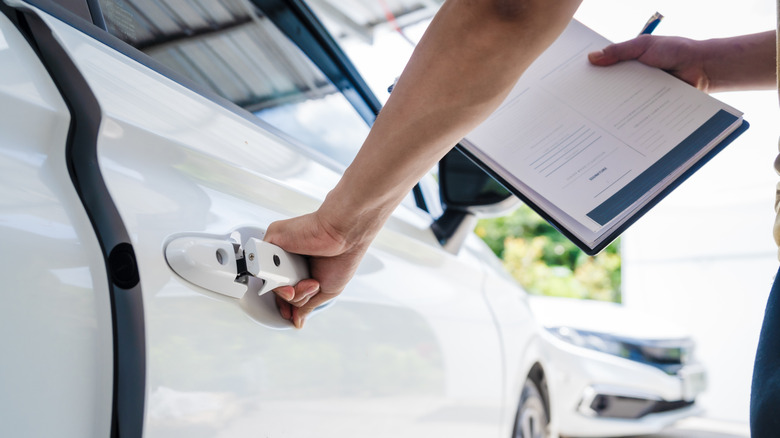Trucks Vs Cars: Which Costs More To Insure?
As fun and freeing as owning and driving a vehicle can be, there's a lot of paperwork one has to get through and keep up with. Aside from things like loan and ownership documents, there's insurance, which is a whole can of worms in and of itself. According to insurance companies, a few used cars are cheaper to insure than most, but on the whole, auto insurance is expensive, can require a lot of research, and demands deliberation over what kind of coverage you want. Further complicating things, not all vehicle types are insured at the same rates.
Looking at two of the broadest vehicle categories, cars and trucks, we find slight differences in insurance premiums. Per data from Quadrant Information Services collected by Bankrate, the average yearly insurance premium for a pickup truck is around $2,424, while cars cost an average of $2,535 for a full year. Thus, if you drive a car, odds are you're going to have to pay just a bit more than the typical truck owner would. Of course, it should be said that these are mere averages, and that there can be some serious deviations from these numbers in either direction.
As any motorist could tell you, insurance can fluctuate based on all kinds of factors. Speaking specifically to the truck versus car comparison, there are a lot of elements that can influence their respective rates — and determine which is the cheaper of the two.
Factors that impact car and truck insurance premiums
There are several common factors that can raise or lower insurance rates. Driving history, age, geographic location, and other personal criteria are basically unavoidable, regardless of what you drive. Meanwhile, you should be aware of some obstacles that cars and trucks specifically have to endure. In the case of trucks, given their size and durability, injuries to drivers and passengers and damage to the ride are reduced, leading to lower premiums. Surprisingly, the bed itself can lower insurance costs, as it's comprised of cheap, easily repairable materials. Conversely, liability insurance is often a must, as trucks are larger than cars and can cause plenty more damage to other vehicles, increasing premiums.
Also worth keeping in mind are the matters of vehicle age and value when comparing car and truck rates. If you get a brand new, expensive pickup truck, odds are your insurance will be higher than the policy attached to an old lemon of a car. This goes both ways, too, with a luxury car costing more to insure than an older, high-mileage truck. Thankfully, there are some new cars that are cheap to insure. Use habits of a car or truck can influence insurance rates as well. If you use a car or truck for work or day-to-day commuting, you're likely to contend with higher rates than if your vehicle was only driven a handful of times per year.
Try as you might to pick the perfect vehicle for your insurance budget, you'll probably have to deal with a higher rate than you'd like to pay for one reason or another. To soften the blow, there are some things you can look into if you want to shave a bit off your insurance costs.
Ways to get discounted car or truck insurance
When looking at insurance for either a car or truck, there are a handful of ways to save money. The biggest is to not settle for the first insurance provider you look into. You want to shop around and compare the costs and benefits different companies could offer. Since, as established, cars and trucks don't tend to cost exactly the same by virtue of them being different vehicles — and a host of other aspects — it's crucial to do your research. Once you find the best insurance brand for you, the next thing to do is explore the potential discounts you can have added to your account.
Driving history and demographic information aside, insurance providers have a few ways of helping you save money. Some offer safe driving discounts, which acclimate your premium cost to match your driving. Make smart, safe decisions on the road, and you'll get a better rate. You can also look into getting a discount if you're a student in good standing, a homeowner, or have multiple vehicles on your policy. Depending on where you live and what's offered, some providers encourage you to take a defensive driving course, lowering your rate while giving you the tools to be a safer driver. This is another area where research is important to make sure you're not missing out.
Insurance isn't fun. It can be pricey, and many auto insurance providers use your data in the worst ways. Nevertheless, it's important for the physical and financial wellbeing of yourself and others. Whether you drive a car or truck, it's a necessity, so you should always do your due diligence to get the best rates and coverage possible.


